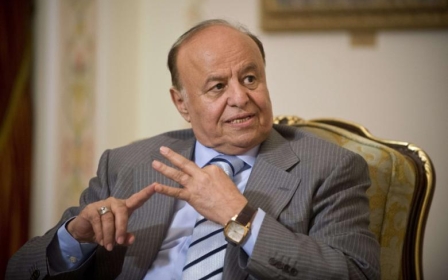Yemen's Hadi under 'house arrest' as Riyadh tightens grip in Saudi Arabia

Saudi Arabia has placed Yemeni President Abd Rabbuh Hadi and his sons under house arrest in Riyadh, barring them from returning home as the kingdom continues its crackdown on alleged corruption.
Speaking on condition of anonymity, Yemeni officials confirmed that Hadi, his sons and several ministers with him have been prevented from going to Yemen, reported AP.
"The Saudis have imposed a form of house arrest on them," the commander said. "When Hadi asks to go, they respond it's not safe for him to return as there are plotters who want to take his life and Saudis fear for his life."
The ban comes after Saudi Arabia cut all air, sea and land borders earlier this week after Houthis fired a ballistic missile at its capital on Saturday. The blockade has prevented two UN humanitarian aid flights from entering the country, sparking both the UN and International Committee of the Red Cross (ICRC) to urge the Saudis to reopen the borders.
"Food, medicine and other essential supplies are critical for the survival of 27 million Yemenis already weakened by a conflict now in its third year," said Robert Mardini, the ICRC's regional director for the Near and Middle East, on Tuesday.
Yemeni officials said the ban on Hadi and his sons was prompted by enmity between the president and the United Arab Emirates, which is part of the Saudi-led coalition against Houthi rebels and has come to dominate southern Yemen, the portion of the country not under rebel control, reported AP.
Anonymous sources also told Middle East Eye that Hadi had been under house arrest for months and since he clashed with UAE Crown Prince Mohammed Bin Zayed during a meeting earlier this year.
Sources close to Hadi told MEE in May said that the Yemeni president had accused the UAE of acting like occupiers rather than its liberators as both countries clashed over who controlled Aden airport.
Increasing anonymity
In February, Hadi flew to Abu Dhabi to patch up differences over who controls Aden's airport, a key support route for Emirati-backed troops and the Yemeni president himself.
The meeting which lasted 10 minutes, took place in a side room in the palace - not the official meeting place for visitors - and ended in a burst of anger and mutual recrimination, sources said.
When Bin Zayed reminded Hadi of how much the UAE had sacrificed in the fight to liberate Yemen, Hadi responded by saying the Emiratis were behaving "like an occupation power in Yemen rather than a force of liberation". This enraged Bin Zayed even more, the sources said.
Saudi Arabia and the UAE are major partners in the Saudi-led coalition's campaign in Yemen, which is supporting the Hadi government's fight against Houthi rebels.
Hadi fled to Saudi Arabia after Houthi rebels advanced to take control of the Yemeni city of Aden in spring 2015.
Officials from Hadi's government also told the Associated Press that Hadi alongside his military officials was barred from leaving Saudi Arabia, where his government had been based during most of Yemen's civil war.
In August, Hadi attempted to leave Saudi Arabia and intended to return to his temporary capital of Aden in southern Yemen.
But according to the commander, he was turned back and told to stay in Riyadh.
New MEE newsletter: Jerusalem Dispatch
Sign up to get the latest insights and analysis on Israel-Palestine, alongside Turkey Unpacked and other MEE newsletters
Middle East Eye delivers independent and unrivalled coverage and analysis of the Middle East, North Africa and beyond. To learn more about republishing this content and the associated fees, please fill out this form. More about MEE can be found here.




